Skin: It’s our biggest organ – but UK dermatology care is in crisis
A chronic shortage of consultants and inadequate training of GPs have led to serious lapses in treatment for conditions that are painful, debilitating and psychologically damaging, reports Steve Boggan

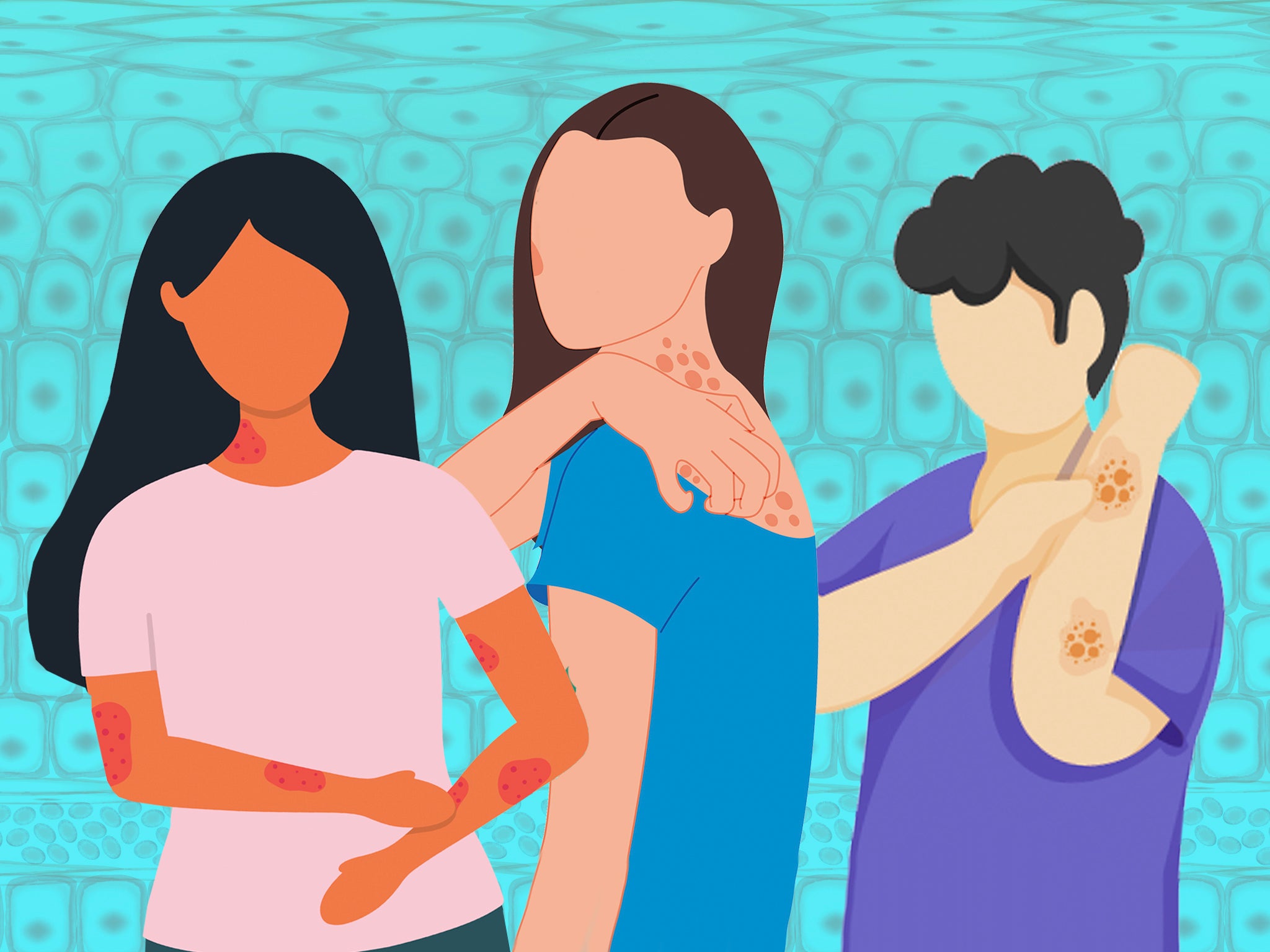
Jackie Adams was terrified. She had never had any problems with her skin and here she was, in her late forties, covered in angry, red, cracked, painful lesions… and they seemed set to cover her whole body. “I woke up one day with a patch on my leg that started itching,” she recalls. “Then it started going red and within a week it was under my arms and all the way down them, down my legs, across my belly, down my back. And everywhere it appeared, it felt like a burning pain.”
Jackie, a no-nonsense businesswoman running two butchers’ shops and a cafe in East Sussex, did what we would all do; she went to her GP. But she was greeted with puzzlement and the suggestion that “maybe” it was shingles.
“I was given some cream and told to come back in two weeks if it didn't go away, but after taking a look on the internet, even I could see it wasn’t shingles and it wasn’t going anywhere,” she says. “I felt the surgery really should have been more aware. I endured the two weeks but it felt like a terrible waste of time.”
Read More:
When Jackie returned to her GP, the advice was to go to Accident & Emergency (A&E) but not A&E at her nearest hospital because that didn't have any emergency dermatology provision. Instead, Jackie was sent to one a 45-minute drive away.
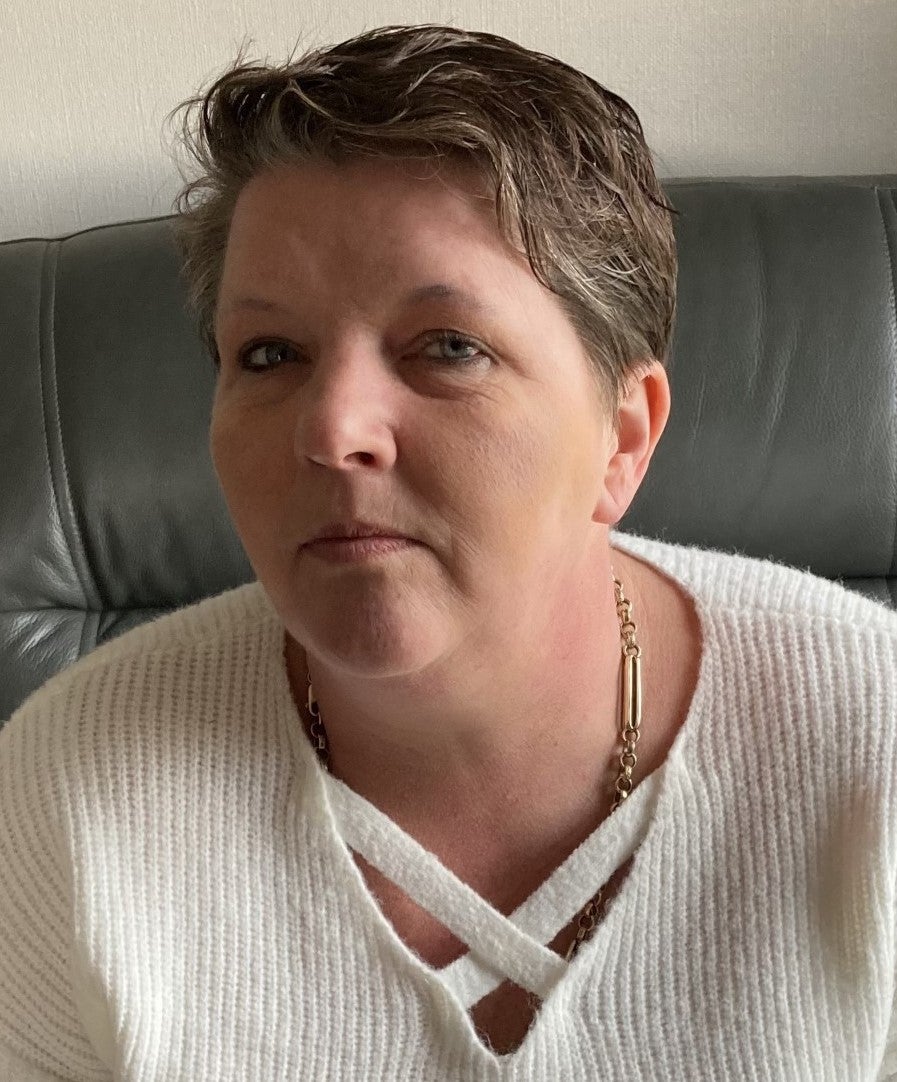
“They didn't have any A&E dermatology either, so they sent me to another department inside the hospital – which also wasn’t dermatology – and the staff there said they didn't know what it was but that it wasn’t shingles. There was one member of staff who took a particular interest in me, not because she was a dermatologist, but because that was a speciality she was interested in going into. I felt like a guinea pig.”
Sadly, Jackie’s experience isn’t unusual. Even before longer waiting times caused by the pandemic, patients struggled to get the help they needed for myriad skin conditions ranging from eczema and psoriasis, to dermatitis and acne.
Chronic shortages of dermatology consultants and inadequate training of GPs have led to serious lapses in levels of treatment for conditions that can be painful, debilitating and psychologically damaging. A report by the All Party Parliamentary Group on Skin (APPGS) last year found that 98 per cent of patients with a skin condition said it affected their emotional and psychological wellbeing – yet only 18 per cent of them had ever received any kind of mental health support for it.
And while one-quarter of all GP appointments are in some way skin-related, most family doctors receive scant training in dermatology, while some receive none at all.
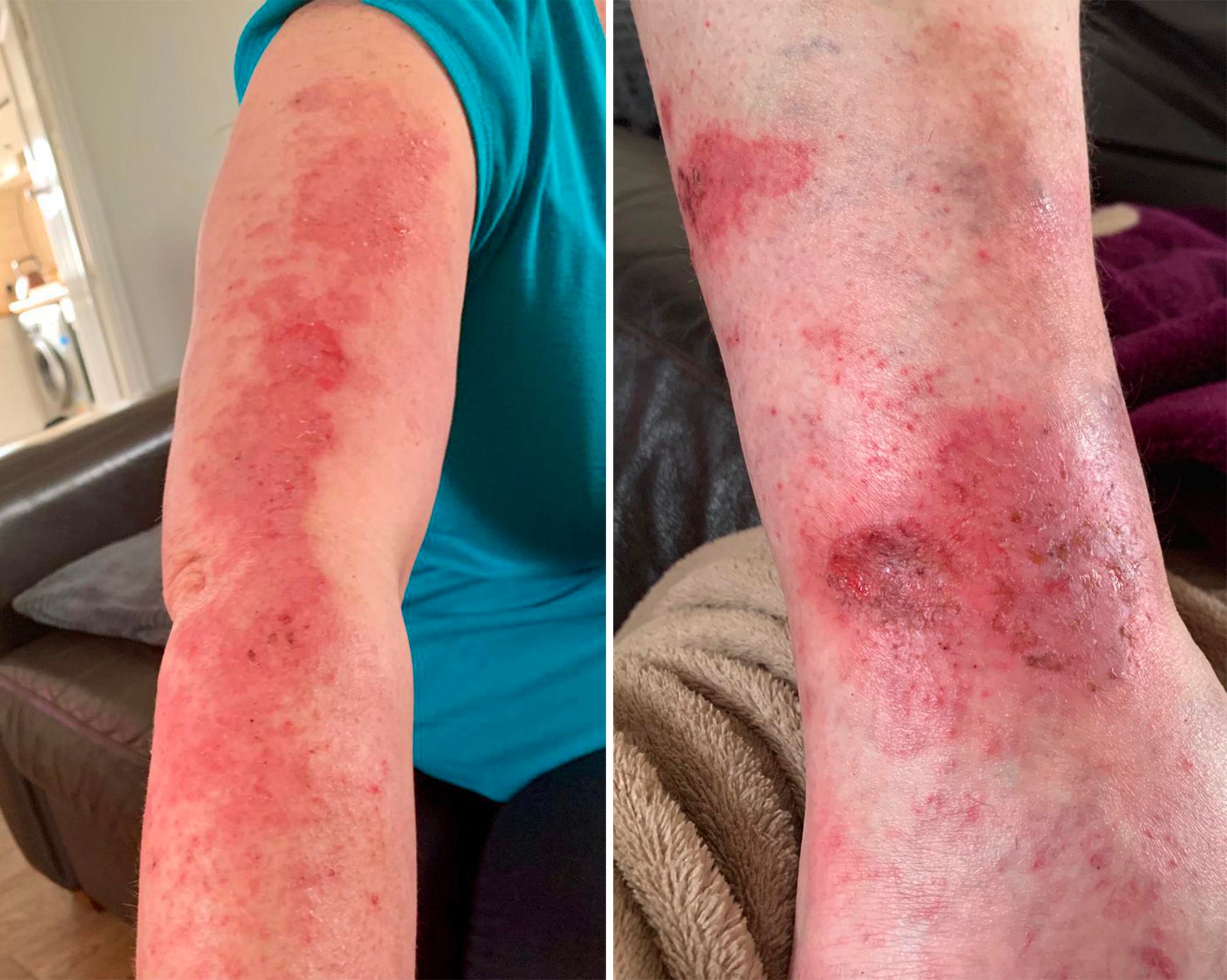
Jackie was eventually referred to a dermatologist conducting clinics at a GP surgery a two-hour round trip from her home. “I came to dread that drive, and the more I dreaded it, the worse my skin got,” she says. “Eventually I was told I had ‘nervous eczema’. They gave me steroid creams, but they didn't work.
“I was offered light treatment – but that is literally a five-minute session with a two-hour journey wrapped around it. I couldn’t face that so I didn't get the treatment. The dermatologist asked my GP if I could be referred to someone closer. To my astonishment, I was sent to someone just five minutes from my home. After a year-and-a-half, it turned out there had been someone on my doorstep the whole time. It just didn't feel like joined-up care.”
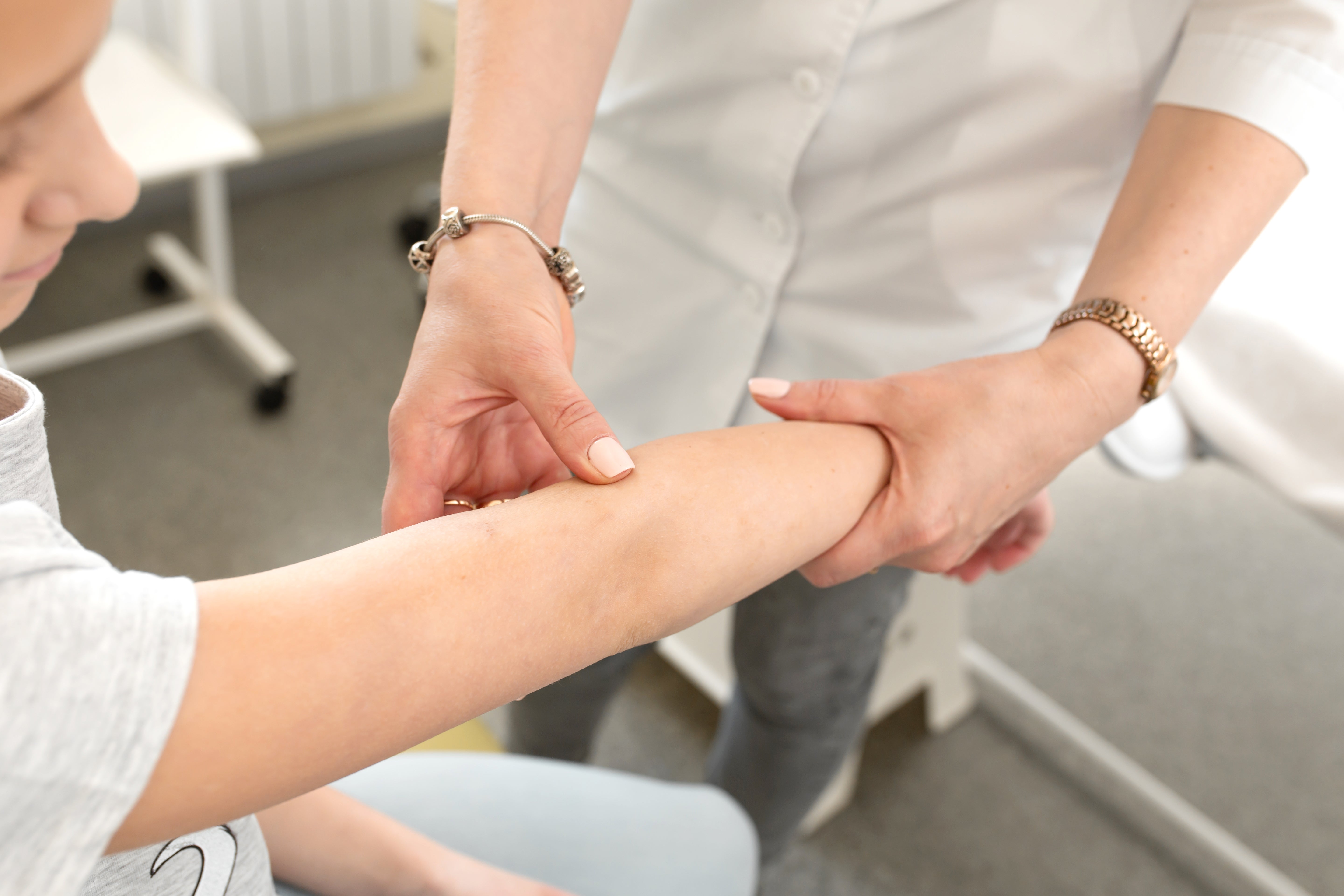
Dermatology provision in the UK is in crisis. We have half the number of dermatologists per head of population than France or Germany, while a 2019 audit by the APPGS found that in some parts of the country, one in five of all dermatology consultants was a locum – and a handful of health trusts had no specialists at all.
“Data obtained in 2019 by the APPGS via Freedom of Information requests to NHS trusts found that there are 818 consultant dermatologists in the whole of the UK – about one for every 79,200 people,” says Dr Tanya Bleiker, president of the British Association of Dermatologists (BAD). “A conservative target would be for the UK to have one consultant dermatologist for every 62,500 people, although ideally this would be more like one for every 55,000 people.”
An NHS report due to be published in the next few months is expected to show that there are 160 unfilled dermatology consultant posts, while a further 140 are being filled by expensive locums employed through agencies.
“We also expect the report to show that at least 10 [NHS] trusts have no dermatologists at all and about a third report severe workforce shortages,” adds Dr Bleiker.
Whether you are sunburnt or syphilitic, your skin will provide the first clues. There are more than 2,000 skin conditions known to medicine
Our skin is important. It is the body’s largest organ, accounting for about 15 per cent of its weight. Its primary role is as a barrier; it protects us from radiation, micro-organisms and the chemicals around us. It regulates body temperature by sweating. It absorbs vital supplies of vitamin D. And it facilitates the sense of touch, enabling us to feel heat and cold, pain and ecstasy.
When something is wrong with us, its first visible manifestation is often on the skin. Whether you are sunburnt or syphilitic, your skin will provide the first clues. There are more than 2,000 skin conditions known to medicine. Some, like cancer, can be fatal; others, such as acne, psoriasis, vitiligo, rosacea and eczema can blight formative years and have a detrimental – and often life-long – effect on confidence and relationships.
According to the healthcare think tank the King’s Fund, in any given year 54 per cent of the population will suffer from some kind of skin condition. But there are fewer than half the number of dermatologists as cardiac specialists. The obvious conclusion is that most skin conditions are not fatal and so a sense of urgency is lacking – yet the impact on a person’s quality of life can be devastating.
![Tanya Bleiker: ‘At least 10 [NHS] trusts have no dermatologists at all and about a third report severe workforce shortages’](https://static.the-independent.com/2021/04/21/16/Dr%20Tanya%20Bleiker.jpeg)
“Dermatology seems to be something of a Cinderella specialism among doctors because most skin conditions won’t kill a person – and so maybe other fields of medicine appear more glamorous,” says David Chandler, co-founder of the Psoriasis and Psoriatic Arthritis Alliance. “Added to that is a failure among many GPs to recognise the psychological impact skin conditions can have on a person.
“People with skin diseases can become self-conscious and feel constantly judged by others who incorrectly believe they are contagious. When they are young, sufferers can be exposed to cruelty from other children, and that excludes them from their social group, often making them feel like outsiders from a very young age.
“Psoriasis is an auto-immune disease that can have triggers, but some doctors just seem to associate it with stress – as if your lifestyle is the cause. And that can result in feelings of guilt, in a sense that your psoriasis is your fault. But it isn’t.”
Psoriasis is an auto-immune condition that speeds up the skin replacement process, meaning cells that normally take 21 to 28 days to replace are produced in a few days. This build-up of cells results in raised “plaques” which can become inflamed, flaky and painful. It can occur on all parts of the body. According to the Psoriasis Association, somewhere between 2 and 3 per cent of the population suffers from the condition.
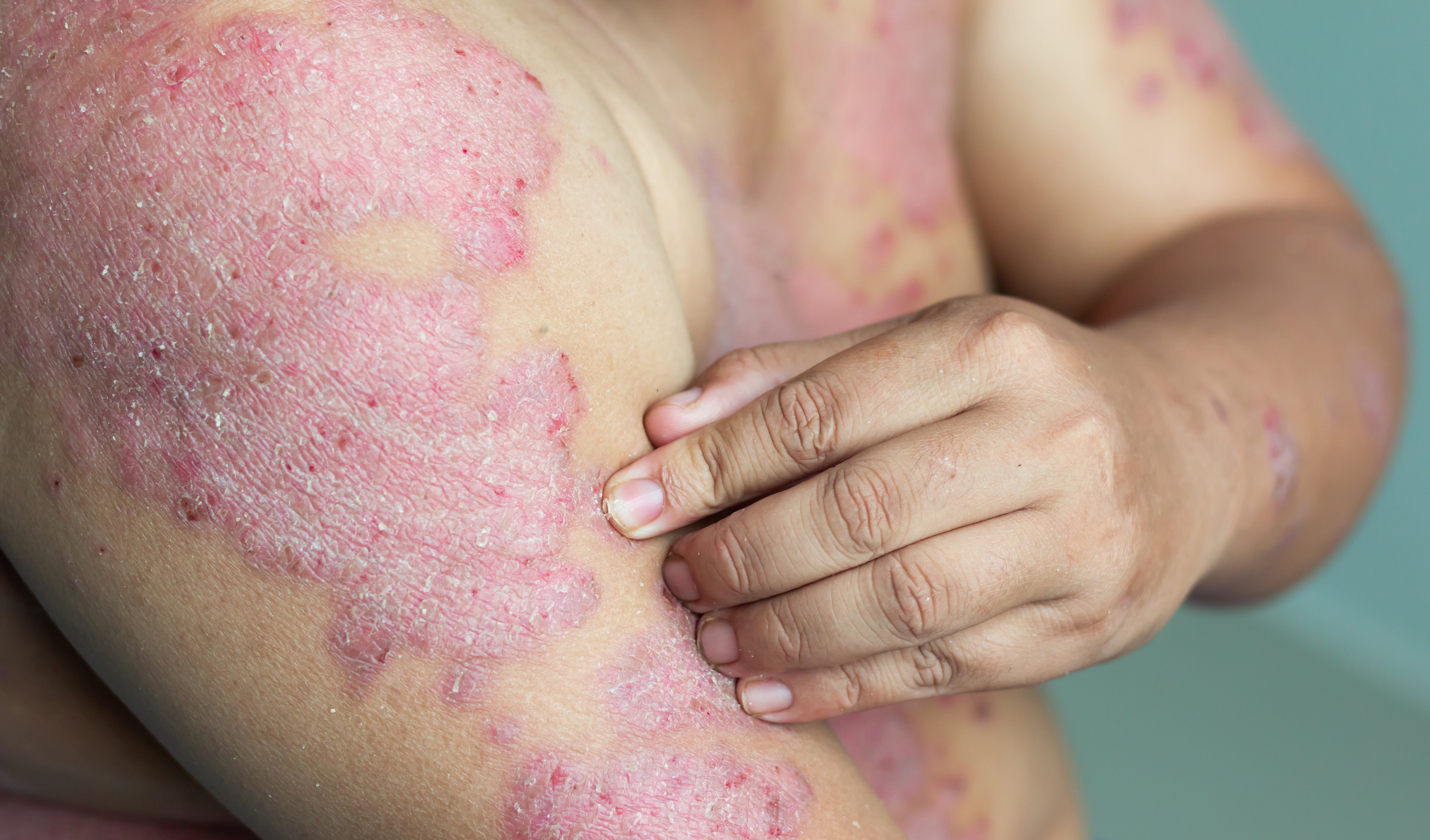
Psychotherapist Jean Knights, 70, has suffered with it for most of her life, an experience that has helped in her treatment of patients who develop mental health issues because of physical problems, some of them skin-related.
“Our skin is like a Geiger counter warning us when things are affecting our well-being,” she says. “We go red with anger, we flush with shame and go pale with fright because our skin expresses our mental states. My first symptoms of psoriasis emerged just after I had been sent to a boarding school at the age of seven – yet my emotional state wasn’t taken into account in my diagnosis. There isn’t much understanding among many doctors of how our minds affect our bodies and our bodies affect our minds.
“Many of the skin patients I have seen over 40 years have very similar experiences when they seek help. You go to see someone who is meant to be an expert. You are very vulnerable as this is your whole body you have to reveal, and then there is often a dismissive attitude. You are told something like, ‘Oh, you’re a chronic psoriatic’, which is what I was called many times. But where does that leave you to go? Nowhere. In my experience, there was never any sense that this person in front of me understood that what they were talking about – my scaly skin – was giving me an enormous sense of shame, and an enormous sense of isolation.
As soon as you have a skin disorder, you have all kinds of emotional and psychological issues around it. It will tie in with our sense of identity
“There is no way that skin disorders should just be seen as physical ailments. As soon as you have a skin disorder, you have all kinds of emotional and psychological issues around it. It will tie in with our sense of identity, there is self-comparison with other people’s skin, our sense of who we are – our sense of belonging, which is vital. We all want to be part of a tribe, so the sense of belonging doesn’t exist for someone who has a skin disorder because other people view your condition as suspicious and that makes you feel worse than an outsider; it can make you feel like an outcast.
“Two of the core features of PTSD are feeling powerless and feeling alone. If you take those two words – powerless and alone – they will cross over to the experience of anybody who has a skin condition. You feel powerless and you feel alone. This is the language of trauma.”
Last year, the APPGS conducted a survey of patients with dermatological disorders for their report, Mental Health and Skin Disease (referred to above). Among its key findings, the report said: “Evidence has shown that the psycho-social impact of skin disease on patients has been chronically underestimated by health care professionals.”
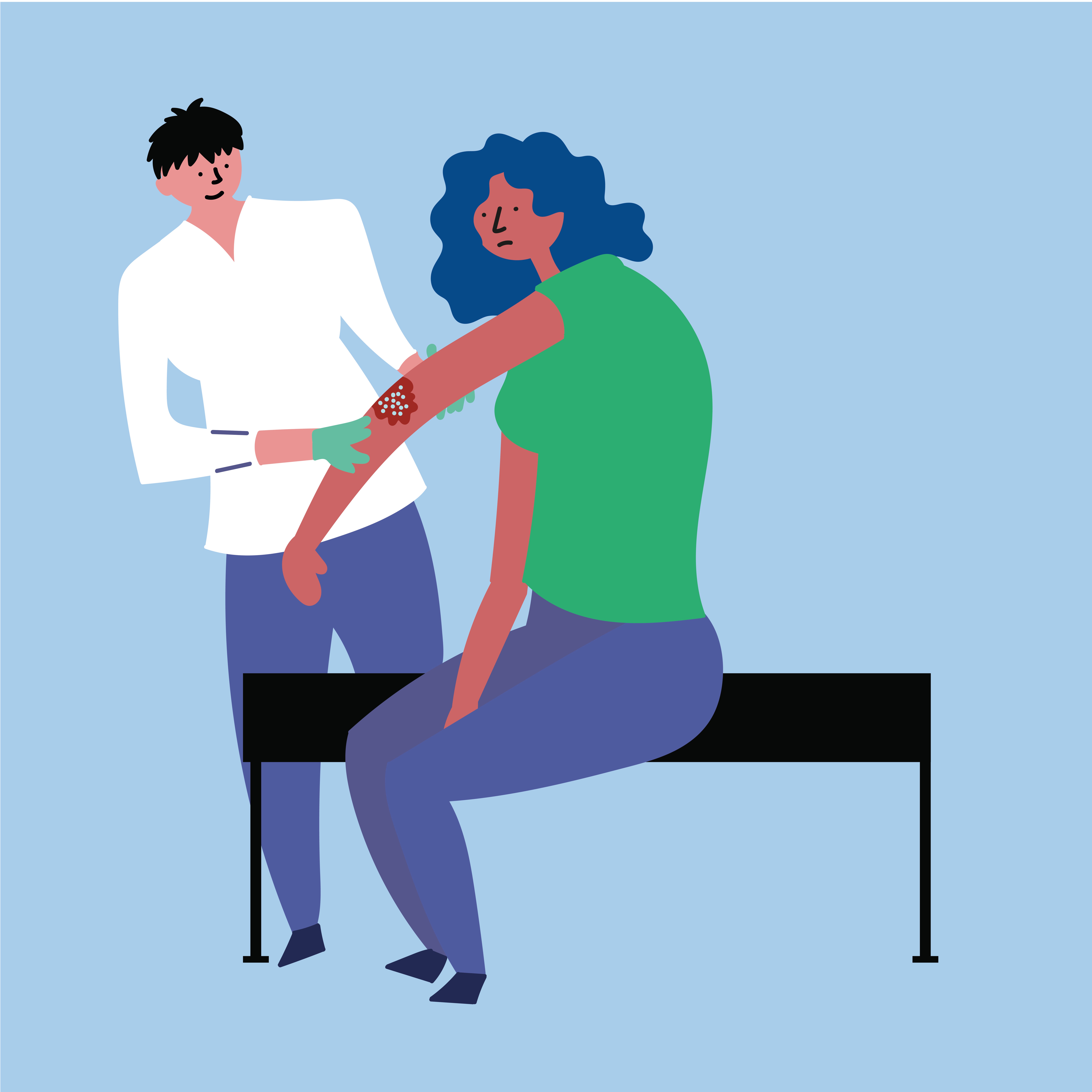
As well as finding that 98 per cent of people with skin disorders reported an impact on their psychological wellbeing, the survey also found that 93 per cent had reduced self-esteem, 73 per cent reported negative effects on intimate relationships, and 5 per cent had suicidal thoughts.
Of the 18 per cent who asked for help (worryingly, 54 per cent did not know the NHS can provide mental health treatment for skin disorders), only one-third received it within a month. Half had to wait up to three months. The report added: “Approximately a quarter of respondents might have waited longer than the NHS’s 18-week target for the time between a patient referral and the start of specialist treatment. Several respondents had to wait over a year and, in one case, it was five years.”
Sir Edward Leigh, the group’s chairman, described the lack of mental health support for people with skin conditions as “alarming”.
“Skin conditions can have a devastating impact on a person’s life,” he said. “Our inquiry heard from many people with a skin condition who have experienced social isolation, stigmatisation, depression, anxiety and even, in some, suicidal thoughts. We also heard that, all too often, children with psychological distress connected to their skin condition suffer without support. This is greatly concerning, as without appropriate mental health support provided in childhood, a person’s life course and long-term wellbeing can be severely impaired.
98%
of people with skin disorders reported an impact on their psychological wellbeing
“Despite the evident need and growing demand for psycho-dermatology services, there is an alarming lack of psychological support available to people living with a skin condition.”
However, even before a patient has sought help for the mental effects of their condition, they have difficulty receiving the physical help they need. Eczema Unmasked, a report published by the National Eczema Society last year, found that more than a third of adults and a similar proportion of children had to wait more than three months to see a dermatologist after being referred to them.
And before referral, many patients experience frustration with their GP. It is not uncommon for patients with chronic skin conditions to say – with some exasperation – that they feel they know more about their ailment than their family doctor does.
“Dermatology training in general in medical schools is inadequate so all doctors lack training,” says Dr Angelika Razzaque, executive chair of the Primary Care Dermatology Society, which represents and helps to educate primary care staff in dermatology. “In terms of GP education, the vocational training schemes vary and very few trainees get to spend some of their rotation in dermatology.
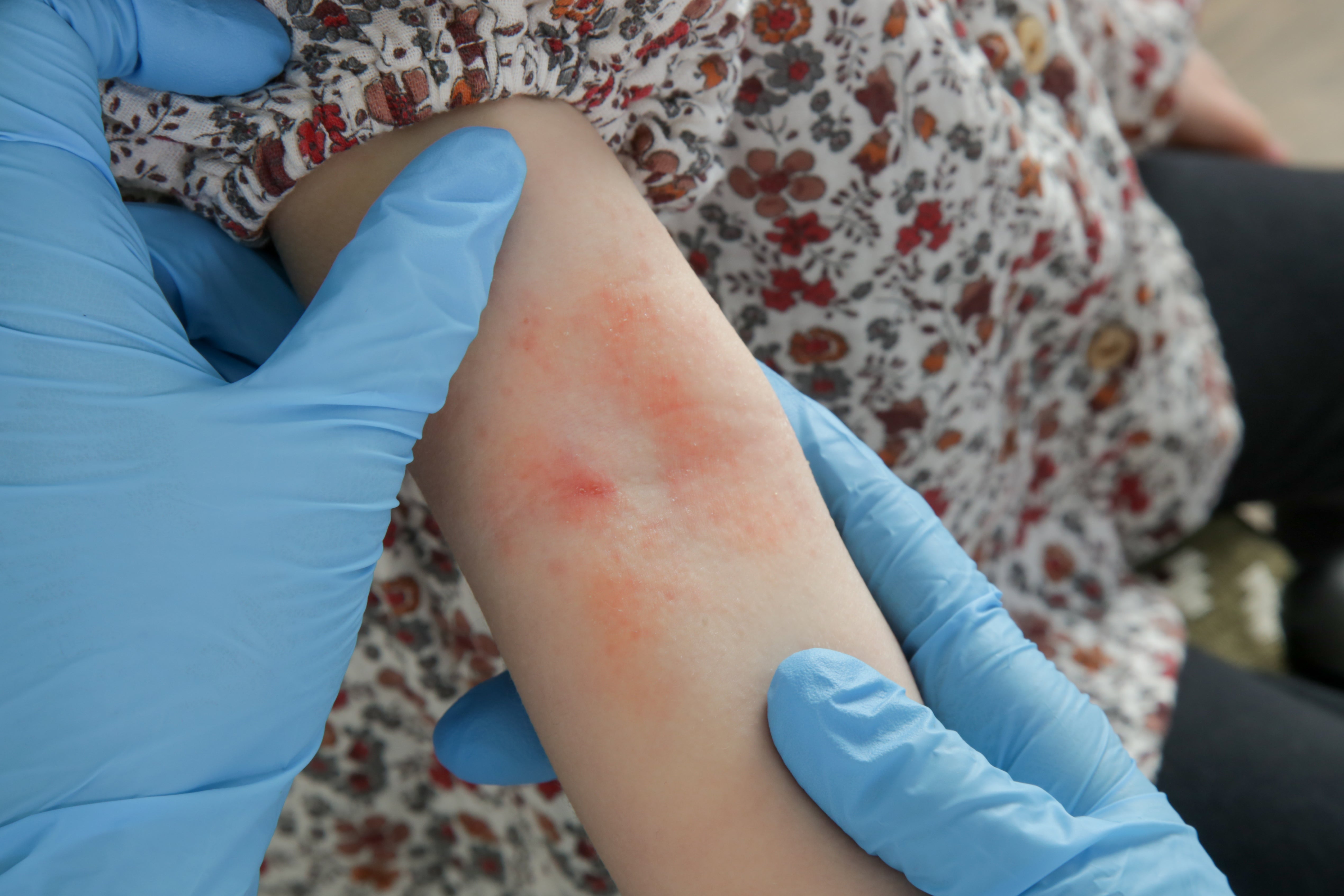
“The Royal College of General Practitioners’ curriculum has some useful guidance for dermatology core knowledge… however, given the thousands of diagnoses in dermatology, reflecting on a few cases is just not enough to cover the vast number of conditions and their different management options. Given that approximately 25 per cent of consultations with GPs are skin-related, there is often a discrepancy between patient expectation and GP knowledge, hence a high dissatisfaction among patients with chronic skin conditions.”
In Eczema Unmasked, Dr George Moncrieff, former chair of the Dermatology Council for England, concurred. “Due to a lack of undergraduate and postgraduate training, often coupled with inadequate local resources to draw on, sadly many GPs are not always equipped to cope with the full needs of people living with a complex condition like eczema,” he said.
“There is a critical need to address these education and service gaps, as we know that up to a quarter of all GP consultations include an element of dermatology, yet, astonishingly, this is still not considered a priority.”
One thing that is clear is that spending on dermatology will have to increase, if only to cope with a huge rise in the number of people being referred with suspected skin cancer
Given the enormous challenges facing GPs, it might seem unfair for patients and fellow clinicians to point such an accusatory finger at them. Professor Martin Marshall, chair of the Royal College of General Practitioners, says that dermatology is included in its curriculum for trainee doctors, and qualifying GPs must demonstrate “competency” in order to practise in the UK.
“GPs have the broadest, yet shortest, curriculum of any medical specialty, and the aim is to expose trainees to the full breadth of conditions they are likely to see in general practice,” he says. “[They] are often the first point for patients that have concerns or problems with their skin. We take these concerns very seriously, understanding the impact it can have on a patient’s physical and mental health, particularly for patients who are long-term sufferers of skin conditions.
“We try to work with patients to develop an appropriate, holistic treatment plan based on their individual needs and circumstances, and if necessary, referring them to specialist services.”
73%
of people with skin disorders reported negative effects on intimate relationships, and 5 per cent had suicidal thoughts.
The BAD, the Royal College of General Practitioners and the Primary Care Dermatology Society say they are all providing courses and support for primary care doctors and/or practice nurses to try to improve patients’ treatment.
The department of health and social care told me that it recognised the need for more doctors and has “increased the number of medical school places by 1,500 over recent years – a 25 per cent increase”. However, it did not refer specifically to tackling the shortage of dermatology specialists.
On provision for mental health services, the department said: “We recognise certain skin conditions are associated with mental health problems. We are committed through our NHS Long Term Plan to investing at least £2.3 billion of extra funding a year into mental health services by 2023-24.”
Again, however, there was no mention of what proportion of this would be ring-fenced for psycho-dermatology provision.
One thing that is clear is that spending on dermatology will have to increase, if only to cope with a huge rise in the number of people being referred with suspected skin cancer. Largely due to due to an ageing population, referrals in England alone climbed from 290,156 in 2015 to 469,575 in 2019.
Read More:
“The dermatology workforce shortage and increasing rates of skin cancer are both extremely challenging problems, for which there is no quick fix,” says Dr Bleiker, BAD’s president. “These are serious problems, which will only get worse without intervention.”
And this would mean an ever-growing workload for an understaffed, unloved and under-resourced discipline that could improve the lives of millions of Britons if only it were given half a chance.
Steve Boggan is a paid adviser to FRANKL Pharma
Join our commenting forum
Join thought-provoking conversations, follow other Independent readers and see their replies
Comments
Bookmark popover
Removed from bookmarks